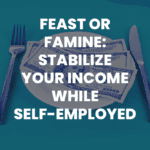Table of Contents
“I was making money from home before it was cool.”
This is a cheezy line I like to say often, because I’ve been an at-home worker and freelancer since 2018. I was by no means the only person working from home back then, but things changed in 2020, didn’t they?
Businesses discovered, and then un-discovered, the value of having a remote workforce. At the same time, many folks who had been working in office jobs decided they much preferred working from home—even if that meant leaving their current job.
For young adults entering the workforce, there are more options than ever to make money from home. But that doesn’t mean working from home is a walk in the park.
Take it from me—I’ve been doing this long enough to know the ups and downs of the WFH lifestyle. When managed correctly, it really can be a dream come true. But there are more than a few challenges that could stymie your quest to work from home.
I’m going to outline those benefits and challenges in this article, so you can start making money from home ASAP (and actually enjoy it when you get there).
This article about making money from home is just one part of our money series. Don’t miss these other topics:
How to make money in college
College saving guide
How to budget in college
How to make money online
How to make passive income
Learn how to pay off student loans
Making money from home: What are your options?
When it comes to earning money from your own home, there are lots of options. But generally, we can divide work-from-home job options into three main categories:
Remote work
Remote workers are full- or part-time employees for a single company—or if you have more than one job, you might have two employers. In most cases, this means you’ll have the same benefits you’d get working full-time in an office, including things like health care, paid time off, and sick days.
Beyond that, the rules and boundaries around remote work can vary wildly. Many jobs will require you to have specific hours you’re online and working, while others will allow you to choose your hours. Some will require you to come into an office occasionally, while others may not even have an office for you to visit.
Finding remote work
Finding remote work isn’t nearly as hard as it used to be. Most job postings will explicitly state whether they are remote or not, and all of the big job platforms (including LinkedIn) allow you to search for jobs that are remote or hybrid (meaning they require some office hours amongst your at-home hours).
This means that to get a remote job that works for you, you’ll need to brush up your resume, update your social media, and prepare yourself for digital interviews. And we have resources to help you with all of that:
Freelance or contracting work
Unlike remote workers, freelancers or contractors won’t derive their income from a single employer. Instead, they’ll offer their services to multiple businesses at once, taking on short-term projects or long-term contracts.
Freelancing or contracting is ideal for those who crave the maximum amount of flexibility when it comes to how, when, and where they work. Being a freelancer for the last few years has allowed me to live life as a digital nomad, for example.
While contractors and freelancers have a lot more control over their day-to-day work, they also have additional responsibilities that full-time workers don’t have to worry about.
Freelancers likely will have to pay for their own health insurance out of pocket, for example. If you choose this option, you’ll be in charge of paying quarterly taxes, rather than having taxes taken out of your paycheck. And perhaps the hardest challenge of being a freelancer is making sure you always have work coming in, so your income remains stable.
Finding freelance work
Freelancers have a variety of tools and strategies they can use to build up a lead pipeline, and it’s all about finding the right balance. The methods you choose largely depend on what you want to do and how much experience you have.
If you’re serious about becoming a freelancer, you should start with our guide: How To Make Money Online for Beginners. If you already know what career path you plan to follow as a freelancer, then these articles are likely going to help you push forward and start earning more:
The entrepreneurial lifestyle
There is a lot of overlap between entrepreneurs and freelancers. Both groups will run their own businesses to earn income, and both will be responsible for things like managing their own taxes or finding customers and clients.
For the purposes of this article, however, we can make a few distinctions between “entrepreneurs” and “freelancers.”
While freelancers typically offer services based on their unique skills, entrepreneurs are focused on operating a business (whether or not they are the ones actually performing the work).
For example, entrepreneurs might start an agency and hire other employees to do the work, while they focus on finding clients or marketing the business. They might open an online shop and sell products, or create an app or online platform they can sell for income.
Freelancers, on the other hand, typically work independently (though they may hire some contactors or virtual assistants to help with their workload). They are typically using their own skills to earn income, and are likely less focused on building a large company with lots of employees.
Being an entrepreneur doesn’t necessarily mean you’ll be working from home, either. Some entrepreneurs might own office space, or provide services that have to be provided in person (like landscaping, for example).
That being said, there are many entrepreneurs that make money from home exclusively.
How to start a business
Starting a business, if you’ve never done it before, can have quite a steep learning curve. You’ll need to learn how to incorporate your business, set up a website, devise a marketing strategy, and so on.
Learning how to start a business could be an article of its own—in fact, we’ve covered it in many articles. Here are some of the best ones to start with:
Making money from home: Common challenges and how to overcome them
Making money from home offers a lot of benefits that are hard to ignore. You get to have more control over your schedule, which means you can spend more quality time with your loved ones, take better care of your health and well-being, or pursue your hobbies and interests. It’s easy to see why so many people find the idea of working from home so appealing.
Those perks are very real; it’s what’s kept me working as a freelancer for the last five years. But there are also major challenges that come with working from home, and sometimes these are hard to see from the outset.
For the last part of this article, I’ll lay out what some of those big challenges are and how to overcome them.
Challenge #1: Keeping your income steady
I provide coaching and mentoring for freelancers, and this is by far the most common challenge I see. At a typical job, you’ll get roughly the same amount of money deposited into your bank account each week.
But for freelancers and entrepreneurs, your income can vary a lot week to week or month to month. Looking at my finances from this past year, there were some months where I made several thousand dollars more or less than others. That’s a big change.
There are ways to mitigate this—landing retainer contracts, rather than short-term projects, is one good way. Or if you’re an entrepreneur, offering something like a subscription service as part of your business can help level out your income fluctuations.
But a certain amount of income variability, often referred to as feast or famine, is inevitable. The real key is learning how to manage it, by predicting your income as best you can, so you can ramp up marketing to get new clients or customers at the right time. Couple this with some good saving strategies, and those big changes in income won’t hurt as much.
Here are more guides to help with this:
Challenge #2: Fighting off the isolation
When I first started working from home, I was so happy to be free of all the crap that comes along with office jobs. The pointless meetings, distracting conversations, forced socialization after work—it all exhausted me!
But once I started working on my own, I quickly realized how isolating being a freelancer or remote worker could be. There’s no one to bounce ideas around with, you can’t vent with co-workers, or share quick ideas, or even take a break with a casual conversation—becaues there’s no one to talk to!
If you want to make money from home long-term, you need outlets that will help stem the isolation. Digital communities are a great place to start—every social media platform has social groups based on interests, career paths, or industries. (Bonus: These can also be great places to network and get new leads).
You can also attend IRL meetups; I’ve found groups in my local area on Facebook, Eventbrite, and Meetup.com. It can be nerve-wracking to attend such events, but once you get over that, it will make working from home much more sustainable.
Here are some more resources to help with this issue:
Challenge #3: Managing your time
Getting more free time in your schedule is one of the benefits of working for yourself. However, using that time wisely can be a massive struggle, especially when you don’t have a manager working in the same space as you to keep you on task.
Time management issues can cause several issues that affect your work-from-home life. Some people may find that procrastination flourishes without a rigid schedule. Others may not know how to turn off their work, and end up putting in more hours than they would at a traditional job, to the detriment of their personal life.
Before you can start working from home, you need to find the right time management strategies for your particular working style. And we have a bunch of resources to help with that:
Challenge #5: Managing taxes & benefits
If you thought paying taxes was complicated when you worked at a full-time job, just wait until you’re working for yourself. Things get a lot more complex when you’re running your own business from home, because you’ll need to set aside money for quarterly tax payments and stay on top of business deductions to keep your tax bill as low as possible.
Fortunately, there is software out there that can make managing taxes a lot easier. Moxie is my personal favorite for freelancers, though Bonsai and Quickbooks are also popular choices.
I highly recommend hiring a tax expert as well. Eventually, you may want a financial advisor to work with on a regular basis, but even having a tax professional who can help you get ready for your big tax payment is worth the cost—you may just end up saving money in the long run, with the tax breaks they help you find.
Making money from home doesn’t have to be a pipe dream
These days, anyone with an internet connection and a willingness to learn and develop new skills can make a living from the comfort of their own home.
With some planning, self-discipline, and perseverance, you can break free from the office life and start enjoying the life of a true WFH superstar.





































